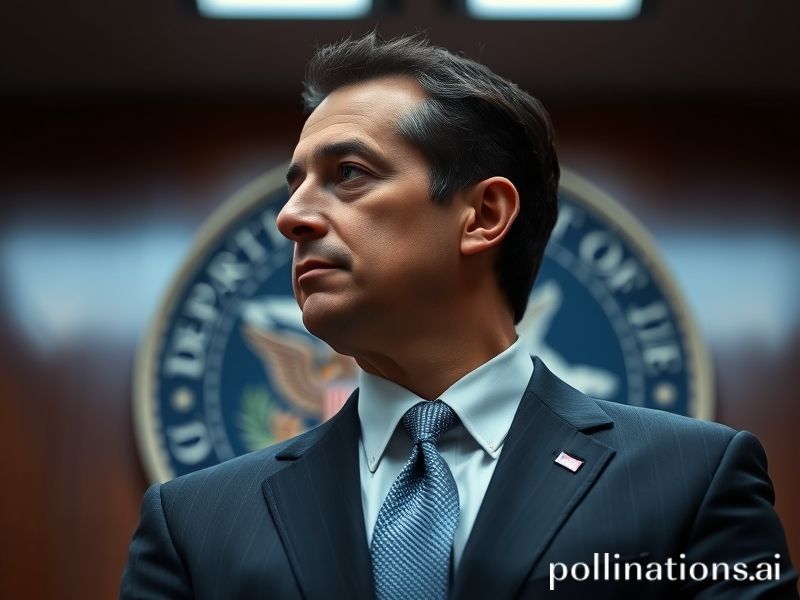From Epstein Enabler to Global Consultant: How Alex Acosta Became the World’s Most Marketable Disgrace
From the Mariana Trench of disgrace to a corner office in Brussels, Alex Acosta has become the world’s most unlikely export since Florida decided mosquitoes needed a public-relations boost. Once the U.S. Labor Secretary who gifted billionaire sex-trafficker Jeffrey Epstein a plea deal so velvet it could upholster a Gulfstream, Acosta has spent the last four years quietly laundering his reputation through the soothing waters of international consultancy. The joke, of course, is on anyone who still believes shame is a barrier to upward mobility in the trans-Atlantic job market.
Acosta’s resurrection tour began in 2020, shortly after he resigned from the Trump cabinet with the practiced solemnity of a funeral director caught selling the casket on eBay. Within months he popped up—like a well-connected fungus—on the European advisory circuit, lending his “expertise” to multinationals grappling with #MeToo blowback and the EU’s new supply-chain slavery rules. There is something grimly poetic about a man who shrugged off underage victims now charging €12,000 a day to teach Volkswagen how to audit its subcontractors. One imagines the PowerPoint slide: “Step 1: Make sure the cameras are off.”
Globally, the spectacle lands differently depending on which passport you carry. In London, where the House of Lords still contains hereditary peers who owe their fortunes to Caribbean sugar plantations, Acosta’s hire was greeted with a collective “cheers, old chap”—proof that the British talent for forgetting atrocities remains as robust as their breakfast tea. In Qatar, where stadiums were built faster than worker safety reports could be shredded, executives welcomed him as a “man who understands optics.” Meanwhile, in Buenos Aires, local activists printed wanted-style posters reading “Se Busca: Cómplice Global,” a charming nod to the fact that impunity now travels with diplomatic immunity and a carry-on full of nondisclosure agreements.
The broader significance is that Acosta is not an outlier but a prototype. From Manila to Munich, the post-pandemic economy rewards crisis-tested bureaucrats who can monetize their own moral crater. The World Economic Forum even hosted a closed-door session last winter titled “Rebranding Disgrace,” moderated by a former FIFA ethics chief—yes, that FIFA—where Acosta shared the stage with a Myanmar junta spokesman and a former Malaysian prime minister currently on trial for embezzlement. Attendees received complimentary tote bags stitched by Cambodian orphans, because nothing says “global governance” like irony you can carry your laptop in.
Human-rights lawyers warn that legitimizing Acosta normalizes the very calculus that lets powerful men trade lives for leverage. Yet multinational boards prefer the devil they can invoice. After all, hiring a disgraced official is cheaper than systemic reform, and the press release practically writes itself: “We are proud to welcome Alexander Acosta’s unparalleled insight into regulatory complexity.” Translation: he knows where the bodies are buried because he signed the burial permits.
The spectacle also underscores a geopolitical shift. As U.S. soft power erodes faster than a sandcastle at high tide, Washington’s exports increasingly come in the form of its discarded elite. We used to ship democracy; now we ship the people who broke it. Foreign capitals, once eager for Fulbright scholars, now roll out red carpets for former cabinet secretaries who can translate American dysfunction into billable hours. Call it the Acosta Doctrine: every empire ends up pimping its own pariahs.
And so the carousel spins. Next month Acosta will keynote a summit in Dubai on “Future-Proofing Leadership,” where he’ll caution executives against “unforced errors”—a phrase that here means “getting caught.” Tickets are $2,500, inclusive of a champagne reception and a discreet side exit. Somewhere in the audience, a young analyst will take notes, unaware that the lesson is not how to avoid scandal, but how to survive it with frequent-flyer miles intact.
In the end, Alex Acosta’s global encore is less a comeback story than a mirror held up to the international order: fractured, transactional, and allergic to accountability. The world shrugs, updates its LinkedIn, and books the next disgrace. After all, why settle for moral clarity when you can expense moral ambiguity?







